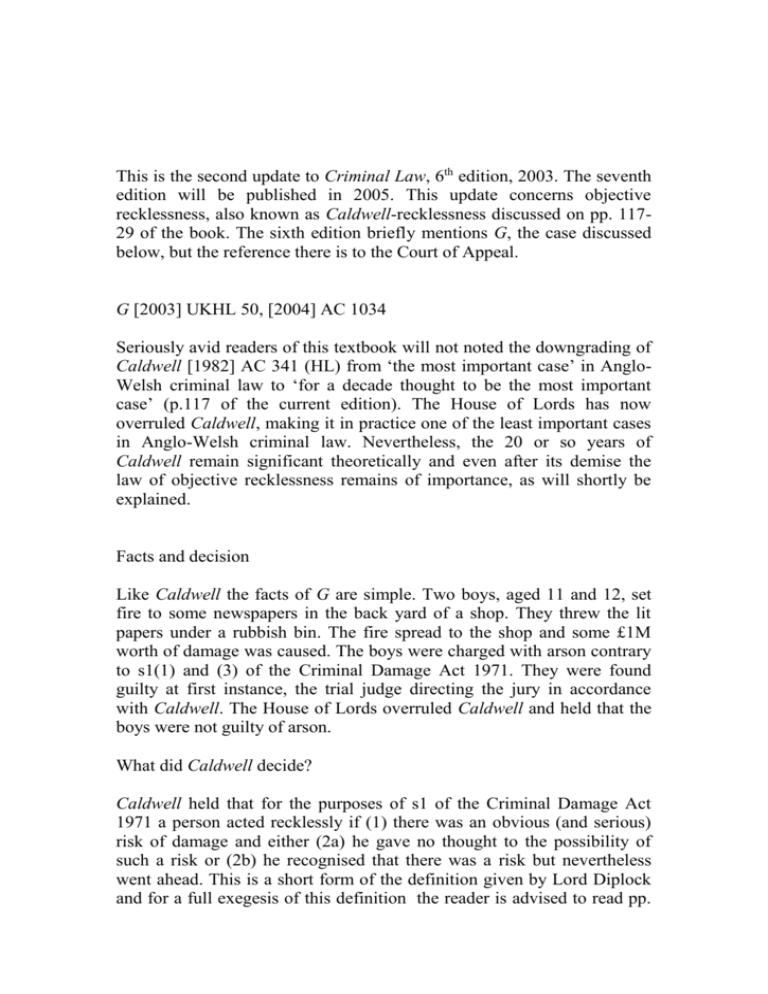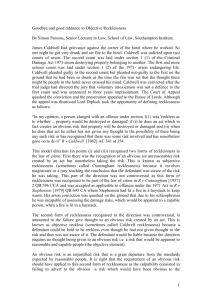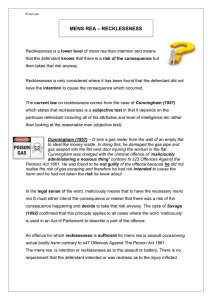This is the second update to Criminal Law, 6th edition, 2003
advertisement

This is the second update to Criminal Law, 6th edition, 2003. The seventh edition will be published in 2005. This update concerns objective recklessness, also known as Caldwell-recklessness discussed on pp. 11729 of the book. The sixth edition briefly mentions G, the case discussed below, but the reference there is to the Court of Appeal. G [2003] UKHL 50, [2004] AC 1034 Seriously avid readers of this textbook will not noted the downgrading of Caldwell [1982] AC 341 (HL) from ‘the most important case’ in AngloWelsh criminal law to ‘for a decade thought to be the most important case’ (p.117 of the current edition). The House of Lords has now overruled Caldwell, making it in practice one of the least important cases in Anglo-Welsh criminal law. Nevertheless, the 20 or so years of Caldwell remain significant theoretically and even after its demise the law of objective recklessness remains of importance, as will shortly be explained. Facts and decision Like Caldwell the facts of G are simple. Two boys, aged 11 and 12, set fire to some newspapers in the back yard of a shop. They threw the lit papers under a rubbish bin. The fire spread to the shop and some £1M worth of damage was caused. The boys were charged with arson contrary to s1(1) and (3) of the Criminal Damage Act 1971. They were found guilty at first instance, the trial judge directing the jury in accordance with Caldwell. The House of Lords overruled Caldwell and held that the boys were not guilty of arson. What did Caldwell decide? Caldwell held that for the purposes of s1 of the Criminal Damage Act 1971 a person acted recklessly if (1) there was an obvious (and serious) risk of damage and either (2a) he gave no thought to the possibility of such a risk or (2b) he recognised that there was a risk but nevertheless went ahead. This is a short form of the definition given by Lord Diplock and for a full exegesis of this definition the reader is advised to read pp. 118-26 of Criminal Law. (2b) is sometimes known as ‘subjective recklessness’ – did this accused foresee the relevant risk? This type of recklessness has existed for more than a century and the principal authority remains Cunningham [1957] 2 QB 396 (CCA). (2a) is objective recklessness: might a reasonable person foresee a risk of some harm occurring? G overruled (2a), often known as Caldwell-recklessness. Subjective recklessness, 2b, remains. Since the boys did not foresee the risk of damage, they were not guilty of arson, which is the crime of causing criminal damage by fire. For a short while in the years following Caldwell objective recklessness was taken to apply to all offences of recklessness unless Parliament had otherwise ordained: Seymour [1983] 2 AC 493 (HL) per Lord Roskill. Offences committed maliciously, which means as Cunningham held, ‘intentionally or recklessly’, constituted the main example of offences where Parliament had otherwise ordained, and subjective recklessness continued to apply to such offences: see Savage [1992] 1 AC 317 (HL). However, even crimes such as rape, which includes the mental element of committing sexual intercourse knowing that the victim did not consent or being reckless as to whether the victim consented or not, were held to be ones of objective recklessness: see the perhaps aptly named case of Pigg [1982] 1 WLR 762 (CA), discussed on p. 597 of Criminal Law. However, the courts began what might be called a retreat from Caldwell, holding that certain offences including rape were not crimes of objective recklessness. Parliament also abolished two of the principal crimes of objective recklessness, reckless driving and causing death by reckless driving (on which see Lawrence [1982] AC 510 (HL) and Reid [1992] 1 WLR 793 (HL)). For further details of the retreat from Caldwell see Jefferson (1999) 63 JCL 57. By 2000 it was difficult to find a crime of objective recklessness other than criminal damage, but the astute knew of recklessly flying a microlight plane and recklessly misusing personal date contrary to the Data Protection Act 1984. How far does G go? All the Law Lords held that the interpretation by Caldwell of s1 of the Criminal Damage Act was incorrect. Parliament did not intend to give a novel definition to recklessness when it replaced the crime of malicious damage with that of intentional or reckless criminal damage: see further point (a) on p. 127 of Criminal Law. Four of their Lordships also said that Caldwell, besides being legally wrong, was morally repugnant: as Lord Bingham put it, ‘… it is not clearly blameworthy to do something involving a risk of injury to another if … one genuinely does not perceive the risk.’ (Lord Bingham, however, cast no doubt on what is sometimes known as ‘constructive recklessness i.e. the deeming of the accused to be reckless when intoxicated by alcohol or drugs for crimes of basic intent in the defence of drunkenness: see Majewski [1977] AC 443 and the part of Caldwell which deals with intoxication. Lord Bingham also disapproved of Elliott v C [1983] 1 WLR 939 (DC): ‘It is neither moral or just to convict a defendant (least of all a child) on the strength of what someone would have apprehended if the defendant had no such apprehension.’ The House could have restricted their speeches to overruling Elliott v C because the defendants were children, thereby preserving Caldwell for adults or at least non-disabled ones, but they did not: both statutory interpretation and moral considerations required the overruling of Caldwell. However, the doctrine of parliamentary supremacy should not be forgotten. At the time when the House of Lords in its judicial capacity was abolishing objective recklessness, the House of Lords in its legislative capacity and the House of Commons were passing the Sexual Offences Act 2003 (see the first update on this site). Rape, for example, can once again be committed by objective recklessness as to the victim’s consent. The statute is, depressingly but unsurprisingly, unclear about children as defendants. The first quote from Lord Bingham, above, continues: ‘Such a person [i.e. an objectively reckless one] may fairly be accused of stupidity or lack of imagination, but neither of these failings should expose him to conviction of serious crime or the risk of punishment.’ Rape is a serious crime; the maximum punishment is life imprisonment. Yet it can now be committed by a person who gave no thought to the lack of consent of the victim. Parliament has not heeded G. The current Home Secretary is pleased with the revised definition of rape, and there is something, indeed quite a bit, to be said in favour of objective recklessness in sexual offences (see the previous update) but it is disappointing to see the arguments of academic commentators not being taken into account by Parliament on such an important issue. It will be interesting to see how the courts deal with boys of 11 and 12 who are charged with rape and who contend that they gave no thought as to whether or not the victim was consenting. Elliott v C produced a disastrous outcome; surely we should be able to prevent similar injustices to children. Let us recall that the extension of the perpetrators of the crime of rape to boys under 14 was enacted as recently as 1993 (see p. 606 of Criminal Law) and it was as recent as 1998 that the doctrine of mischievous discretion was abolished (see p. 264 of Criminal Law). Outstanding issues (a) Lord Bingham said: ‘I wish to make it as plain as I can that I am not addressing the meaning of “reckless” in any other statutory or common law context.’ This proposition is very much akin to that of Lord Steyn in Woollin [1999] 1 AC 82 (HL) that the definition he gave for intent in murder was not necessarily the one which applied throughout criminal law (see Criminal Law pp. 75-6). This method of proceeding is unacceptable in a mature system of law. Can it really be true that Caldwell is abolished for criminal damage but not for other offences of objective recklessness such as recklessly flying a microlight? Lord Bingham stated that a person was reckless as to a circumstance when ‘he is aware of a risk that it exists or will exist’ and that a person is reckless as to a consequence if ‘he is aware of a risk that it will occur’. These are standard definitions of subjective recklessness as to a circumstance and as to a consequence but he prefaced these definitions by saying that they applied for the purposes of the Criminal Damage Act. In B [2000] 2 AC 428 (HL), the facts and discussion of which in the context of strict liability occur on p. 181 of Criminal Law, a different formulation was made. In the context of sexual offences at least, if the accused has not thought about a circumstance, such as the consent of the victim, then he is guilty unless he believes that the circumstance does not exist. It is, it must be said, difficult to envisage someone who is not thinking about a circumstance but who at the same time genuinely believes that it does not exist. Perhaps an example might be this: Y and Z have been lovers for several years; Y does not on this occasion think about whether Z is consenting or not but, if asked, would say that he believes that his partner is consenting because he or she has always consented before. If this example is correct, Y is not guilty of rape under both G and B. If, however, Y and Z have not been in a long-term relationship but this is the first occasion of sexual intercourse, then if Y gave no thought to whether Z was consenting or not, he is not guilty under G but is under B. An immediate resolution of this inconsistency would be extremely helpful. (b) Five Law Lords dealt with statutory interpretation, four of them with the lack of moral culpability of inadvertent recklessness. That leaves one Lord who did not treat of the moral dimension. This was Lord Rodger. He said that objective recklessness was a possible ground of liability for some offences. If Caldwell is overruled in relation to criminal damage but that Caldwell is so morally repugnant that four Law Lords say that it should not be part of a civilised system of law, what scope is there for Lord Rodger’s exception? It is highly tentatively suggested that what he may have had in mind was the previous offence of reckless driving. Here the recklessness is not as to a consequence or as to a circumstance but as to the manner in which the act, driving, was performed. Lord Bingham said: ‘… I would wish to throw no doubt on the decisions of this House in Lawrence and Reid.’ If there are offences where recklessness is as to the way in which the act is done, it may be that the mental element is one of objective recklessness. This issue will have to be settled in the future. (c) Cases like G and B indicate a return to subjective mens rea. It should be noted that nothing in G affects gross negligence manslaughter. Of course that offence was according to Seymour replaced by reckless manslaughter but the House of Lords in Adomako [1995] 1 AC 171 returned to manslaughter by gross negligence, reviving the pre-Caldwell law (see Criminal Law pp. 540-5). Similarly, nothing in G affects duress, whether by threats or circumstances. The Court of Appeal in Graham [1982] 1 WLR 294, which was approved by the House of Lords in Howe [1987] AC 417, held that in duress the accused’s belief in the existence of the threat had to be based on reasonable grounds. Lord Steyn in G opined that Graham and Howe were correct. There is some contrary authority, Martin [2000] 2 Cr App R 42 (CA): see Criminal Law pp. 268-9. Martin, as that passage states, is incorrect. For casenotes on G see K. Amirthalingam (2004) 67 MLR 491 and A. Ashworth [2004] Crim LR 369.








